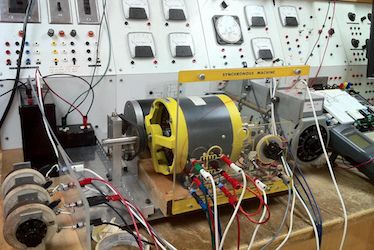 Although most of us alive today don’t remember a world before electricity and technology, it certainly wasn’t always possible to turn on a light with a flick of a switch or to communicate across the globe with the push of a button. Practically every device that uses or conducts electricity was designed by electrical engineers. The demand is steady for innovative professionals to continue to steer the technology of the modern world, and the field is fulfilling, with plenty of room for professionals to specialize their career in interests that can range from motors to electronics to aviation. Check out an online electrical engineering degree program and power up your career. Electrical engineers study the laws and mechanics of electricity, power generation and power distribution. Advancing technology means most electronics—from GPS units to cell phones—need input from an electrical engineer. Using logic and creativity, these engineers design, test and troubleshoot power control systems and devices.
Although most of us alive today don’t remember a world before electricity and technology, it certainly wasn’t always possible to turn on a light with a flick of a switch or to communicate across the globe with the push of a button. Practically every device that uses or conducts electricity was designed by electrical engineers. The demand is steady for innovative professionals to continue to steer the technology of the modern world, and the field is fulfilling, with plenty of room for professionals to specialize their career in interests that can range from motors to electronics to aviation. Check out an online electrical engineering degree program and power up your career. Electrical engineers study the laws and mechanics of electricity, power generation and power distribution. Advancing technology means most electronics—from GPS units to cell phones—need input from an electrical engineer. Using logic and creativity, these engineers design, test and troubleshoot power control systems and devices.
THE CAREER PATH
Since electrical engineering involves practically any products and systems related to electricity and power, there’s a broad variety of specializations that engineers can choose to dedicate their career to. The profession is accessible to aspiring engineers of any background, age, and experience and can easily be shaped to suit the lifestyle, education, and needs of each individual.
Although there are many branches under the umbrella of electrical engineering, the field has been categorized into two major specializations, according to the Department of Labor (DOL):
- Electrical Engineering – The branch of engineering that involves designing, building, maintaining, testing, and supervising the manufacturing of electrical equipment.
- Electronic Engineering – The branch of engineering that is related to electronic components, software, products, and systems. Electronics professionals may research, develop, and evaluate electronic devices.
Although the DOL distinguishes between electrical and electronic engineering, it also emphasizes the strong similarities between their work, using engineering and design software and equipment to perform various tasks.
Depending on how you’d like to start your career or education, you may choose to enter the field as a electrical or electronic engineering technician, with an associate’s degree making more than $60,000 on average each year. Electrical engineers typically must have at least a bachelor’s degree and make nearly $95,000 annually on average. No matter which path or pace you decide is right for your lifestyle and goals, a career in electrical engineering is guaranteed to pay off in the long run.
WHO IS THE IDEAL CANDIDATE?
It goes without saying that careers in any type of engineering are not for those who are easily confused by numbers—these types of jobs require a lot of math and problem-solving. When it comes to electrical engineering, an eye for details and an ability to concentrate are also must-haves for successful professionals.
Electrical engineering is a relatively new field, filled with opportunities for discovery. Aspiring professionals must be creative and innovative if they hope to be competitive in this ever-evolving field. The career is also not for introverts: oftentimes, professionals must collaborate and communicate with other engineers and clients in order to successfully complete their projects. If you’re the type of person who can balance interpersonal skills as well as your ability to problem-solve and analyze the small things, then you might be perfect for electrical engineering.
WHAT SHOULD I LOOK FOR?
At the technician level, electrical engineers may work as electricians or electrical and power technicians. They may install and maintain wiring and power systems in homes, offices or factories. They may also help construct power systems, or build and repair power technologies. Some electrical engineering degree online programs teach computer engineering. Others focus on the skills needed to design and troubleshoot power control systems for aircrafts, naval vessels and submarines. According to the U.S. Department of Labor Statistics, most electrical engineers are employed in the power plant industry.
The most prestigious electrical engineering programs will have earned additional, programmatic accreditation from the Accrediting Board for Engineering and Technology (ABET). Expect these online electrical engineering program to include coursework in these disciplines: electronics engineering, control and signal processing, microelectronics, telecommunications, computer engineering and/or instrumentation.
Whether you’re ready to advance your career through dedication to a bachelor’s degree or higher education, or if you want to transition through an associate degree and get some experience under your belt, there’s an option in electrical engineering for you. As with all online engineering degrees, an applied technology degree may be available at the undergraduate level. Applied technology programs are appropriate for engineering technicians. Working as a technician is an option for professionals getting started with an associate’s level of education. In order to qualify as an engineer, professionals must obtain a bachelor’s degree which will come with the highest pay and best career mobility. Most electrical engineering online programs are master of science in engineering (MSE) degrees or master of engineering (ME) non-thesis degrees.
Licenses are not required for most entry-level positions, but as competitive professionals seek to advance their careers, they may be interested in a Professional Engineer certification, which are issued by states.
COST
Our rankings reveal that the average cost of a master’s level online engineering degree is just under $28,000. Keep in mind, however, that programs can be up to $10,000 cheaper or $90,000 more expensive. Make sure to look into the options that offer the best bang for your buck and prepare you to explore your interests and goals in a budget-friendly program.


